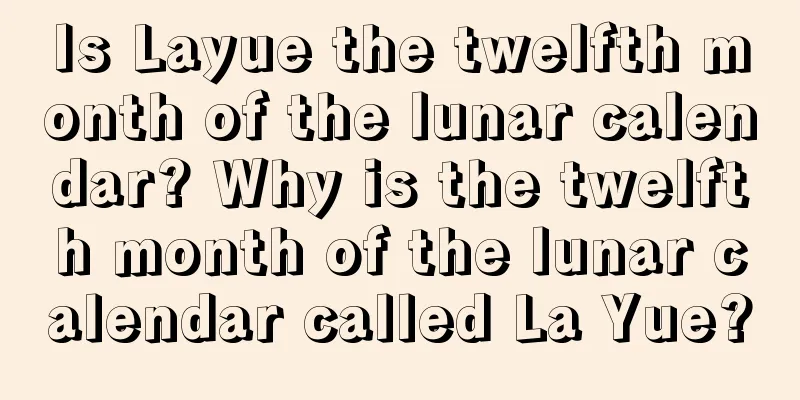Is Layue the twelfth month of the lunar calendar? Why is the twelfth month of the lunar calendar called La Yue?

I believe everyone is familiar with the twelfth month of the lunar calendar, but not everyone knows whether the twelfth month of the lunar calendar is the twelfth month of the lunar calendar. So, let’s take a look together, is the twelfth month of the lunar calendar? Why is the twelfth month of the lunar calendar called La Yue? The biting cold wind cannot blow away people's enthusiasm for the twelfth lunar month. Festivals and celebrations are coming one after another. The Fortune Teller website has prepared a lot of information about the twelfth lunar month for you, please feel free to check it out.Is Layue the twelfth month of the lunar calendar?Yes, the twelfth month of the lunar calendar is the twelfth month.Layue is another name for the twelfth month at the end of the year. Regarding "La", there were records of "Rou Fu" and "La Wei" as early as in works such as "The Book of Changes" and "The Book of Rites". The original meaning of "La" is "dried meat". There are many names for the twelfth month of the year, the most well-known of which is "La Yue". The weather this month is most suitable for air-drying and making cured meat, so it is called "La Yue". Why is the twelfth month of the lunar calendar called La Yue?The twelfth month of the lunar calendar is called La Yue, which actually has something to do with customs.The original meaning of "La" is dried meat. The climate at the end of the year is most suitable for air-drying and making cured meats. As it is almost the new year, most New Year dishes are made in this month. The twelfth month is at the end of the year, during the transition period between the old and the new year. In ancient times, it was the month with more year-end sacrifices. According to Customs and Rites by Ying Shao, a scholar of the Han Dynasty, "La means connection, the handover of the old and the new, so a grand sacrifice is held to reward the merits." There is a similar statement in the Book of Sui, Rites and Etiquette: "In November of the fourth year of Kaihuang, the imperial edict said: La was called in ancient times, which means connection, and it means the alternation of the old and the new." This means that La contains the meaning of replacement of the old and the new, and bidding farewell to the old and welcoming the new. Another year is about to end. At this time of the year when the old year is replaced by the new year, people offer sacrifices to their ancestors and family gods to report a year of longevity and good harvests, and share the joy of the harvest in heaven and on earth. "Yuzhu Baodian" states: "La is the great sacrifice of the year." "Duduan" states: "La is the great sacrifice at the end of the year." "Book of Rites·Monthly Ordinances" states: "In the first month of winter, the families offer five sacrifices to their ancestors." The objects of the La sacrifice are the ancestors and the gods. People offer various kinds of sacrifices reverently to thank their ancestors and household gods for their blessings and to pray for good weather, good harvests, thriving livestock, and good health for the whole family in the coming year. Therefore, the twelfth month of the lunar calendar is also called La Yue. |
>>: Does the summer solstice mean the arrival of summer? Is it the first day of the dog days?
Recommend
Is May 26th of the lunar calendar in 2019 an auspicious day for ancestor worship? Is it a good day to visit the graves and worship our ancestors?
Introduction: Sacrifice is also an important matte...
Where is the auspicious position of the God of Wealth on the summer solstice, June 21, 2018?
Introduction: The God of Wealth is the deity in ch...
2020 June 1st, leap April (10th day) - Query of auspicious and unlucky events during the twelve hours
Children's Day is a happy festival, represent...
Is it a good idea to give birth on the ninth day of the Lunar New Year in 2021? When is the best time to give birth?
People born in different time periods have differe...
What is the origin of Qingming Festival? Are there any customs for Qingming Festival?
Introduction: Qingming Festival is a custom of anc...
The auspicious and inauspicious times of June 22, 2020, and the taboos of different times
June is a hot month and the lotus flowers are in ...
Can I get married on April 29th of the leap lunar calendar in 2020? Is it an auspicious day?
2020 is a leap year, with a leap April. Leap Apri...
What festivals are there in the twelfth lunar month of 2021? What are the customs?
The festivals in different months are also differe...
Is it a good idea to get a haircut on February 29th of the lunar calendar in 2018?
Introduction: Haircut can make people more energet...
Which zodiac signs will have better fortune after the beginning of winter in 2017?
Introduction: Beginning of Winter is one of the 24...
What are the customs and traditions of the Little New Year in the twelfth lunar month? Are there any taboos?
"Xiao Nian" is a traditional festival of...
What are the precautions for the Great Heat? What are the do's and don'ts to pay attention to?
Introduction: The Great Heat falls during the hott...
What zodiac sign is June 11, 2018 in the lunar calendar?
The constellation representing June 11, 2018 in th...
Where is the position of the God of Happiness on July 21, 2017? Check the position of the God of Happiness
1. What day is July 21st in the lunar calendar 20...
Is it a good idea to move house on October 23rd of the lunar calendar in 2020?
Good things always like to happen in winter, beca...









